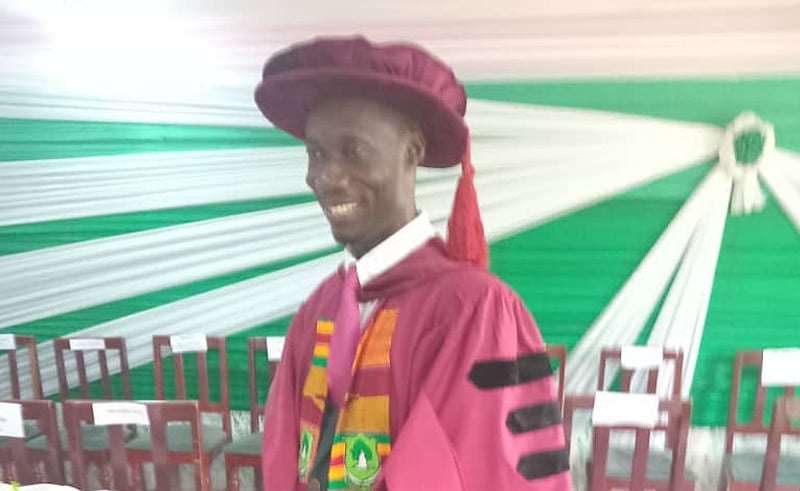Dr. Samuel Qwamena Agyei, a recent PhD graduate in Culture and Development from the Millar Institute for Transdisciplinary and Development Studies (MITDS), delivered a compelling address at the institute’s 7th Congregation, challenging the prevailing development paradigm in Africa. He argued vehemently for a shift away from foreign-dependent models towards strategies grounded in indigenous knowledge and resources, reflecting the unique socio-cultural contexts of the continent. Dr. Agyei’s central thesis revolved around the idea that enduring development in Africa hinges on harnessing the continent’s own strengths and capacities, rather than relying on external interventions that often fail to resonate with local realities. The graduation ceremony, which celebrated the academic achievements of eleven doctoral candidates, provided a platform for Dr. Agyei to articulate his vision for a self-reliant Africa, capable of charting its own development trajectory.
Dr. Agyei’s critique of the existing development approach stems from the observation that decades of reliance on foreign aid and externally imposed models have yielded limited success. He contends that institutions like the World Bank and the IMF, despite their interventions, cannot foster genuine development if African nations continue to neglect their own indigenous knowledge and resources. He highlighted the inherent limitations of applying Western-centric development frameworks to African societies, emphasizing the need for context-specific solutions that acknowledge the continent’s unique cultural tapestry and historical experiences. This echoes a growing sentiment among development practitioners and scholars that sustainable development must be rooted in local ownership and driven by local innovation.
Illustrating his point, Dr. Agyei cited examples of nations that have prioritized indigenous strategies and achieved notable progress. He pointed to Burkina Faso, under its current leadership, as a case study of a country increasingly embracing local solutions to address national challenges. This emphasis on self-reliance, he argued, is a key ingredient for sustainable development. He also referenced China, a nation that has experienced rapid economic growth, partly attributed to its strategic focus on leveraging internal resources and adapting external influences to fit its own context. These examples serve to underscore the potential of locally driven development and the importance of tailoring strategies to specific national circumstances. He contrasted these success stories with the persistent challenges faced by countries heavily reliant on foreign aid, suggesting a correlation between self-reliance and developmental progress.
Turning his attention to Ghana, Dr. Agyei reflected on historical initiatives that attempted to promote self-sufficiency, albeit with mixed results. He mentioned the “Operation Feed Yourself” program launched during the Acheampong regime in the 1970s, an ambitious project aimed at boosting local agricultural production and reducing food imports. While acknowledging the program’s initial promise and its emphasis on local empowerment, he lamented its eventual demise due to inconsistent political will and a lack of long-term commitment. This historical example underscores the importance of sustained political commitment and policy consistency for the successful implementation of locally-driven development initiatives.
Furthermore, Dr. Agyei lamented the decline of local industries in Ghana, citing the collapse of factories, such as meat and tomato processing plants in the Upper East Region, as evidence of a systemic failure to support local production. He attributed this decline to inconsistent policies and a lack of prioritization of local industry development. He argued that these factories, strategically located near sources of raw materials, could have thrived and contributed significantly to the local economy if they had received consistent support and policy backing. This critique highlights the need for a comprehensive industrial policy that prioritizes local value addition and promotes sustainable economic growth.
To foster self-reliance and strengthen local economies, Dr. Agyei urged Ghanaians and Africans in general to prioritize the consumption of locally made goods. He emphasized the importance of supporting local businesses, from traditional crafts like smocks and shoes to locally produced food products. This, he argued, would not only boost local economies but also reinforce cultural identity and pride. He cited the example of Ghanaian innovator Apostle Dr. Kwadwo Safo Kantanka, whose ventures in manufacturing and technology demonstrate the potential of indigenous innovation when given adequate support and recognition. This call for supporting local businesses reflects a broader movement towards promoting local entrepreneurship and building resilient local economies.
In his concluding remarks, Dr. Agyei issued a passionate appeal to African policymakers to embrace indigenous development models. He challenged the ingrained notion that progress can only be achieved through external intervention, urging leaders to recognize the immense potential residing within the continent and its people. He emphasized the need to “unlearn” the dependency mindset and cultivate a belief in Africa’s capacity to drive its own development agenda. This resonates with a growing pan-Africanist sentiment that calls for self-determination and a reimagining of the continent’s future based on its own strengths and values. The ceremony at MITDS, a hub for transdisciplinary research and education focused on addressing Africa’s complex developmental challenges, provided a fitting backdrop for Dr. Agyei’s impassioned call for a paradigm shift in development thinking. His message underscores the urgent need for a more inclusive and locally-driven approach to development, one that prioritizes indigenous knowledge, empowers local communities, and unleashes the continent’s vast potential.


